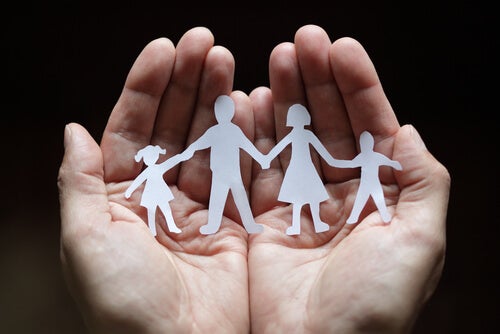When You're Embarrassed by Your Family

If you’re embarrassed by your family, then you might need to work on yourself. That being said, the majority of family conflicts happen during adolescence, as that’s the time when most people criticize their parents.
However, sometimes those conflicts don’t resolve themselves as you mature and can persist as adults. Shame is a feeling that stems from judging others. You might feel it when some aspect you don’t like about yourself is exposed.
When you’re embarrassed by your family, it’s as if you were embarrassed by yourself in one way or another. Humanity is one big tree and each one of us is like a leaf that belongs to a certain branch. Similarly, you help form your family, and your family forms you. Thus, your family makes you who you are. So is embarrassment a valid feeling?
Embarrassment as a feeling
People feel embarrassed for a lot of reasons. While some of them are reasonable, others just aren’t. Sometimes, you might feel embarrassed by a specific situation. Other times, it’s a feeling that seems to stick to you permanently. In extreme cases, you might even feel embarrassed to exist or to be who you are, as if your life were an insult to others.

Without going to those extremes, we can say that, usually, feelings of embarrassment stem from a rigid consciousness. Your own consciousness points the finger at you. Sometimes, that finger points at someone else.
There’s a difference between embarrassment and guilt. With guilt, you might feel reproachful and that you’ve lost some dignity. On the other hand, embarrassment affects your personal intimacy, as something you wanted to keep secret came to light. It means that you’ve seen yourself as a failure. Embarrassment kicks in when you feel exposed and suppose that others see you as a failure as well.
When you’re embarrassed by your family
If you’re embarrassed by your family specifically, you probably consider other parts of your immediate environment as reprehensible. You want to keep certain things hidden from others. Sometimes, those aspects are simply objective. However, other times, it’s just a reflection of the way you see things.

You may be embarrassed by your family because, for example, one of them does illegal things. In that case, the embarrassment is more than justified since it’s a risk to your own good name. However, many people are embarrassed due to poverty or physical defects. It might even be that your family doesn’t conform to some predetermined ideal in your own mind.
In both situations, there’s a problem that needs to be solved, as there are aspects you haven’t accepted. Embarrassment is being conscious of having two faces, and the healthy thing is to integrate them into one consistent whole. To do this, you must make consistent decisions with who you are and what you believe in.
If you’re embarrassed by your family for objective reasons, we recommend giving yourself some space. It doesn’t necessarily have to be between you and your family, but between you and their actions. You can do this openly.
However, if your embarrassment is a result of your own insecurities regarding your social class or economic position, then it might be time to reflect on your own values. The problem might not be your family but your own insecurities instead.
All cited sources were thoroughly reviewed by our team to ensure their quality, reliability, currency, and validity. The bibliography of this article was considered reliable and of academic or scientific accuracy.
Morrison, A. P. (1997). La Cultura de la vergüenza: anatomía de un sentimiento ambiguo (Vol. 30). Grupo Planeta (GBS).
This text is provided for informational purposes only and does not replace consultation with a professional. If in doubt, consult your specialist.








